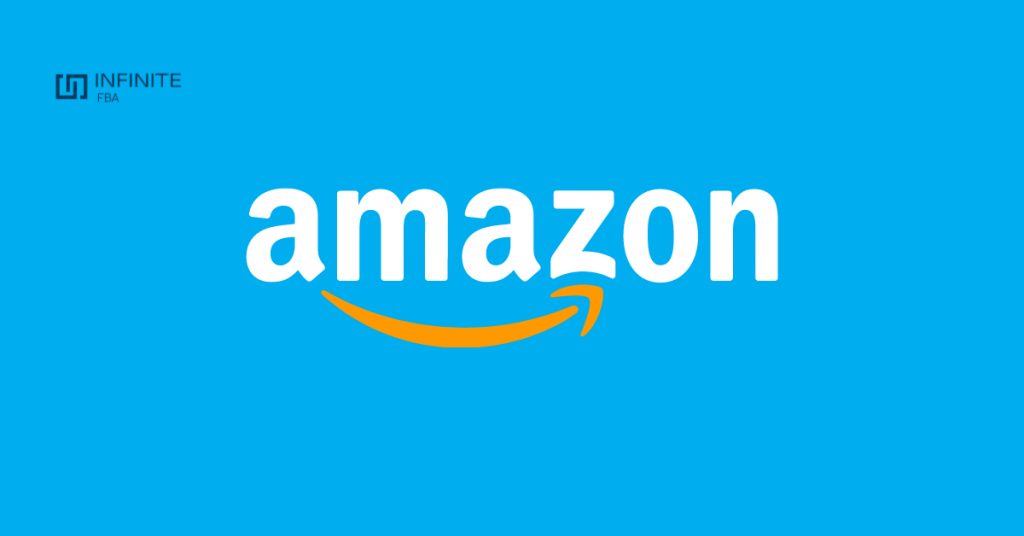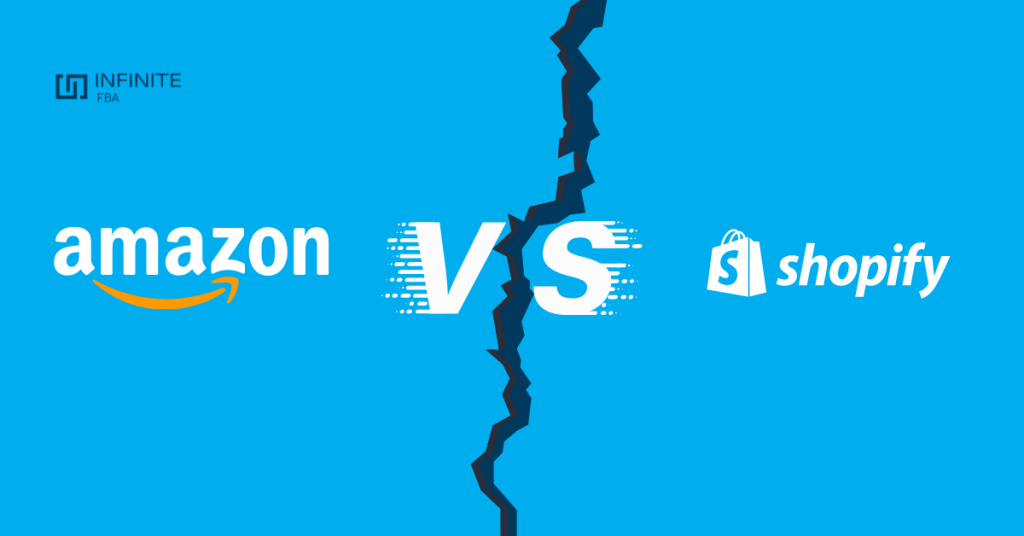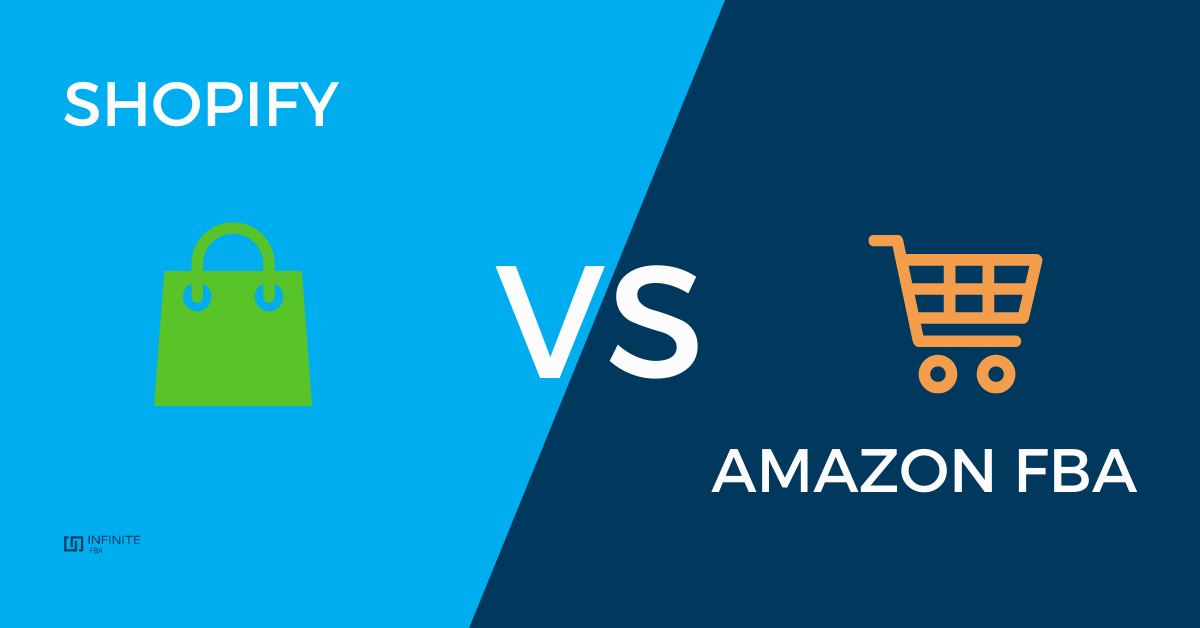Shopify vs Amazon – the battle of two platforms you cannot ignore if you need a jump-started entry to selling products online. Over the past decade, both online shopping platforms have helped thousands of sellers to generate profits. Even though the numbers vary, Amazon FBA and Shopify make it easy to get started with online sales — regardless of whether you manufacture the product.
It means you can access options such as dropshipping if you are interested. However, even when we keep dropshipping at the side, the online sales capabilities of Amazon FBA and Shopify are worth mastering. Only then can you choose the right online selling platform for your business idea.
We thought we could help by making a comparison between Shopify and Amazon FBA. The following article is a one-to-one comparison of Shopify vs Amazon FBA from different perspectives of starting an online store. For instance, we will look at the fees, shipping system, transportation norms, packaging requirements, marketing needs, etc.
In the end, we can also recommend who should opt for Shopify and who should stick to Amazon FBA. We want to assure you that we have sourced all the information from official sources. Therefore, you can count on what we have informed you about before starting a Shopify or Amazon FBA business in this Shopify vs Amazon guide.
A Brief Introduction to Amazon and Shopify Store
We will compare and contrast some essential aspects of Amazon and Spotify. It will give you a brief idea of what both platforms stand for. First, of course, we have explored the online shopping platform aspect of Amazon and Shopify since both companies have an incredible variety of services in different sectors.
Amazon — an Introduction

Amazon is currently the world’s largest online marketplace and eCommerce platform, which has its presence in almost every continent in the world. It started as a company selling books but went onto becoming an online site where everything A to Z is available.
In addition to the United States website, which is the central one, Amazon offers exclusive websites for other marketplaces, such as the UK, Italy, India, Canada, UAE, etc. All these marketplaces come optimized to provide a seamless shopping experience for customers.
Over these years, Amazon has built a reputation for delivering on its promises. For instance, users get to enjoy super-fast deliveries and reliable customer support. Needless to say, Amazon houses one of the biggest collections of products across many categories.
From electronics to home appliances and from baby products to cosmetics, there is little that you cannot find on Amazon. Amazon Prime, the subscription service from the online store, is one of the most sought-after subscriptions in the United States.
Every day, millions of users visit Amazon.com looking forward to buying something they need or want. It could be the brand-new Kindle eBook reader or the food supply for their pup. In any case, Amazon is ready for the work, thanks to the thousands of sellers on the platform.
So, if you want to become one of those sellers who receive enormous profits, Amazon FBA is an option you can consider. Fulfilled-by-Amazon sellers enjoy lots of privileges that non-FBA sellers do not. We will talk more about them in the following sections.
Shopify — an Introduction

Shopify is an easy-to-use online shopping website builder and sales management suite, which has become quite popular across global markets. The platform allows customers to build their small online stores instead of a centralized marketplace.
For instance, instead of having a single domain as Amazon does, Shopify will help people create thousands of their own domain names. In addition, the service pack contains a lot of features that a potential seller can explore.
In other words, building an eCommerce website using Shopify is as easy as a piece of cake. The best part is that a user does not need technical expertise to develop their eCommerce website. Instead, you can build a compelling website using pre-designed themes and widgets.
You can also integrate options for payment and customer feedback, among other things. As you can guess, the customer has to deal with packaging, shipping, and fulfillment of orders. Alternatively, Shopify-based sellers can resort to dropshipping services.
Regardless of your choice, sellers have better control over how their Shopify website works and serves all the users. In the case of Amazon, it is not possible since you are catering to a super-huge marketplace. It is also worth noting that you do not have to use Shopify all alone.
It comes with a number of integrations, such as PayPal and Stripe, making everything easier. In short, Shopify can be your go-to selling platform if you are looking for maximum control.
Selling on Amazon FBA vs Selling on Shopify Online Store
Now, we will compare the processes of selling products on Amazon FBA and Shopify. We have tried to keep this part focused on the process itself. In addition, this section will cover the pros and cons of each type. We believe it is a significant part to get started with.
Selling on Amazon FBA Marketplace
As we said earlier, you can get started with selling products on Amazon FBA without any hassle. Because you are one of the many sellers on the Amazon eCommerce platform, you do not have to worry about the tech part at all. Instead, you must be ready to set up your packaging, shipping, and logistics sections based on the directions from Amazon FBA.
Once you have become a part of the Amazon FBA business, your primary objective is to set up the inventory and manage the listing. Everything else is taken care of by Amazon itself. You will understand more when we compare the core pointers between Amazon FBA and Shopify.
Of course, the Amazon FBA method has its fair share of pros and cons. You must understand these dualities before you pick one of the selling platforms.

Pros
- Amazon FBA is easy to get started with. You do not need technical expertise to become an Amazon FBA seller on the platform. Amazon FBA also provides precise directions and suggestions regarding how you can start a business.
- As we mentioned earlier, Amazon is one of the biggest online marketplaces in the world. It means a product can receive potential customers from every part of the world. Therefore, you, as a seller, can have better success.
- Amazon FBA offers an incredible collection of management and analytics tools you can use. You can benefit from these tools when it comes to ensuring maximum sales for the listing. It will also help you establish sustainable contact with your existing customers.
- Even though you have to pay a specific subscription fee to become a part of Amazon FBA, the number is quite okay. Therefore, you do not have to worry about overspending. More importantly, you will end up paying a lot more if you were to set up shipping and packaging all by yourself.
- With Amazon FBA business, you can ensure the best delivery speed for your products. It happens so because your products are handled by the experienced shipping network at Amazon. So, speed and reliability will never be compromised.
- If you are entirely new to an eCommerce business but want maximum reach for your products, the Amazon FBA option is the best. The amount of money and effort you have to dedicate to the process is meager, but the results could be groundbreaking.
Cons
- While Amazon FBA is cost-effective when selling low-weight products, it is not the case with a heavy-weight product. In that case, you may end up spending a lot more than you expect the FBA business to cost.
- Because Amazon becomes the middleman in the business, you do not have much control over your inventory or the selling process. So, in practical terms, you lose control when you send the inventory to one of the Amazon fulfillment centers.
- As we said, Amazon is strict when it comes to rules and regulations. However, if you do not have the right resources, complying with these regulations could be risky. Needless to say, your seller account would face problems.
- Last but not least, even though Amazon gives you some customization options, your products will be one of the thousands of options on the platform. It may not be the desirable option for most people, primarily if you deal with creative products.
Selling on Shopify Online Marketplace
Compared to selling on Amazon FBA, selling on Shopify requires a few more steps. First, you have to design your website using the available themes, templates, and widgets. Then, you have to add products to eCommerce and set up your inventory.
Then, based on how you would like to ship the product, you can also connect the website to your inventory and shipping service. Last but not least, you need to integrate the site to a payment gateway like PayPal or Stripe. Once you have done these things, along with a few sub-steps, a Shopify-based eCommerce site will be ready to commence its journey.
Because Shopify stands on the other side of the spectrum, we must understand the pros and cons of using the platform for online sales.
Pros
- Even though Shopify store requires you to set up an eCommerce store, you do not have to be a coding expert to do that. Instead, the simple User Interface and other features in the Shopify platform will help you get started without any trouble.
- You have so much control over every aspect of your eCommerce website when you set it up using a platform like Shopify. You can change how the website looks and works just like you manage different listings.
- Unlike Amazon, where listing creation and management are difficult, Shopify can make things easier than ever. Because you happen to be your boss, you do not have to worry about strict regulations or standards, either.
- Customizability is one of the most vital points of a Shopify-based selling system. You can customize almost all parts of the website, including integrations. For instance, you can choose between various shipping/fulfillment options.
- Shopify is a great platform when it comes to dropshipping. In the end, you can turn off the listing and adjust the stock as per the demand and supply. But, unfortunately, it is not the case when you sign up for the Amazon FBA business.
- Last but not least, Shopify can be pretty cost-effective. Of course, you will have to pay a good amount of money to get started, but that is it. But then, you can pay for resources as you use them, with multiple listings available at a time.
Cons
- Even though Shopify store does not cost much, the first-time processes could be effort-taking. For instance, you may find it difficult to set up the shipping and fulfillment systems in the first place. It would apply most to first-time eCommerce investors.
- Depending on the product you want to ship, you may have to spend exorbitant fees for shipping at times. Of course, the final amount would depend on the type of the product and its weight. Nevertheless, it is a risk you cannot ignore.
- With a Shopify online store, you have to take full responsibility for promotion. On the other hand, FBA Amazon business offered some leverage due to the current popularity of the Amazon.com site. The same is the case when we talk about the reach of the product.
- When you enable drop shipping or self-shipping via Shopify, you cannot have the strictest measures for Quality Analysis. On the flip side, because you have control over the inventory at all times, making slight changes would be possible, which is not the case with Amazon FBA.
Comparing Sales on Amazon FBA and Shopify
Now that you know the pros and cons of selling on Amazon FBA and Shopify, shall we compare the platforms based on specific criteria?
Fees
· Amazon FBA
On Amazon FBA, you need a seller account to start selling products. You can choose between Individual and Professional versions, which cost $0.99 per item sold and $39.99 per month, respectively. We must add that many valuable features are not available in the Individual plan. It has been designed for beginners who have started selling products. The Individual plan does not offer access to advanced analytics features, either.
On the other hand, the Amazon professional seller account offers so many advanced features and lower costs per order. However, do not think that this is the only fee you pay for Amazon FBA. In addition to these structured fees, Amazon will also charge a referral fee. Also, as you know, you store your inventory at Amazon’s locations when you sign up for FBA. Therefore, you may have to spend other fees in addition to transaction fees.
We must also note a few other types of fees. Even though both Amazon and Shopify have some fees, the referral fees and monthly inventory storage fees are exclusive to Amazon. You do not have to deal with these monthly fees even if you have Shopify Lite. You can save a lot of money from transaction fee if you use Shopify Payment platform.
· Shopify
You can choose between three plans from Shopify: Basic Shopify, Shopify, and Advanced Shopify. The first plan, Basic Shopify, costs $29 per month, while the Shopify plan will set you back at $79 per month.
On the other hand, the Advanced Shopify plan will cost $299 per month, offering additional benefits. You can get the essential eCommerce features with all these plans.
In addition to the monthly subscription fees, Shopify will charge a commission for online credit cards and in-person credit card payments. They start from 2.9% + 30 cents according to the plan.
On top of these, Shopify charges 2% additional fees when you use a payment system other than Shopify Payments. However, the extra cost is set at 1.0% and 0.5% for the Shopify and Advanced Shopify plans, respectively, which are great transaction fees.
Shipping
· Amazon FBA
Shipping is completely taken care of by Amazon’s shipping network when you are part of Amazon FBA. In most cases, your product will be eligible for Amazon Prime, which assures 1-day or 2-day delivery without any cost to the buyer. Therefore, your products will reach the customer without hassle since the Amazon system is tried and tested for different needs. In addition, Amazon uses a combination of powerful robots and trained professionals to ensure the smoothest shipping experience.
· Shopify
When you have a Shopify-based website, you must be more concerned about the shipping process. It does not take place as seamlessly as you would expect. As we said, Shopify allows integrations with some shipping and drop shipping services.
However, optimizing your workflow is more complex than sending all your inventory to the nearest Amazon center. Therefore, shipping is an area where FBA is superior, offering you peace of mind.
Transportation
· Amazon FBA
You do not have to worry about transportation when you are dealing with Amazon FBA. The first and last thing you have to do is send the inventory to the recommended Amazon Fulfillment Center. The company will then transport the contents to different parts of the world according to demand. As long as you pay the FBA fee, there is nothing to worry about.
· Shopify
You are supposed to take care of transportation when you have a Shopify-based website. In addition, you have to make sure that the product reaches your customers in demand. Based on these needs, you may have to choose between multiple shipping providers.
On the other hand, if you are using drop shipping for the online store, things could be easier for a bit.
Packaging
· Amazon FBA
You do not have much freedom as an Amazon FBA customer when it comes to packaging. As we said, the company is strict about the way a package looks and moves. Therefore, you will have to comply with these directives in the end.
Doing so may be difficult at first, but it can be a time-saver and minimal once you get the hang of it.
· Shopify
Unless you cause a problem with the shipping service, you can pack your products in any way you like. While there is room for marketing that we cannot ignore, the versatility could be a problem at times.
On the bright side, you can present the packages in a personalized way if you want. It is a better option if you are dealing with creative/customized products. It is one of the best things that Shopify offers.
Marketing
· Amazon FBA
Amazon offers few options to market the product via the Amazon seller account. Of course, you can use the basic dataset to promote your listing on the website. After that, you will have to rely on third-party marketing solutions. Even then, you cannot integrate these marketing suites to Amazon.
· Shopify
With Shopify, you have a better shot at marketing. There are a few reasons why. First, because you have a standalone website/webpage, it is effortless to market everything. Second, you can integrate marketing services to Shopify for an enhanced experience. For instance, you can introduce discount codes and other eCommerce tools. You can also find options like abandoned cart recovery, which is not the case with Amazon.
We hope we have cleared your major doubts regarding Amazon FBA and Shopify. However, we must also add that you cannot integrate drop shipping services to Amazon. With Shopify, however, it would be a piece of cake.
Now, we will share some conclusive thoughts with you. But don’t worry; we will keep it short and simple.
Who Should Opt for Shopify?
- You should opt for Shopify if
- You want to have maximum control over the eCommerce website
- You want to sell and deliver customized products with no restrictions
- You do not mind paying extra for the additional weight or options
- You are okay with taking care of packaging, transportation, and shipping
- You are willing to spend extra time and money on marketing the products
- You want to integrate services like drop shipping and feedback systems
- You want the best website interface and branding identity for the web store
Who Should Opt for Amazon FBA?
- An Amazon FBA online store is your choice if
- You do not want to spend time on shipping, packaging, or transportation
- You are selling products in bulk without many changes in shape or type
- You are okay with the marketing options from Amazon and transaction fees
- You do not want to miss the millions of user base from Amazon
- You do not mind the increasing competition on the Amazon eCommerce store
- You are okay with spending a considerable amount of money per order
- You can comply with the strict rules as dictated by Amazon and pay monthly fee
Conclusion
Do you still have any doubts about choosing between Amazon FBA and Shopify as the e-commerce platform for your own online store? Do let us know through your comments if you still have Amazon vs Shopify doubts.
Resources:






